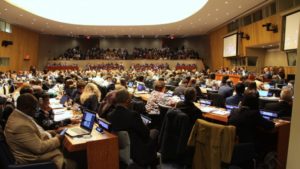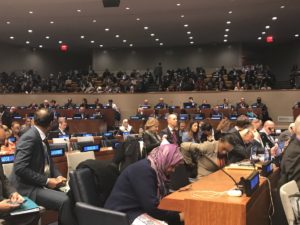By Winnie Kamau
The Late Renowned Swedish Professor Hans Rosling was honored posthumously at the 49th Session of the UN Statistical Commission annual meeting for his great efforts in communicating with Data. Hans Rosling was able to change the perception of data and communicate numbers related to global development in a way that everyone could understand. The founder of Gapminder a platform that helps demystify statistics died one year ago on 7th February 2017 of Pancreatic cancer
Speaking at the meeting attended by over 120 chief statisticians and data experts from across the world Joakim Stymne Director General Statistics Sweden saying “We do share a common belief, that our statistical information is an important component in the way we understand the world we live in, and that everyone should have a chance to form their own opinion based on statistical information,”
The host of the conference was the United Nations Department of Economic and Social Affairs (UN DESA) led by the Under-Secretary-General Liu Zhenmin as he opened the official session appreciated the work of the Statisticians and the role they played “I greatly value the work you do in advancing statistics globally, in particular, in support of the 2030 Agenda for Sustainable Development”. Liu also praised the work of the Commission, highlighting, in particular, the milestone accomplishment of establishing a framework of 232 indicators that will help measure SDGs progress.
‘Thinking outside the box’ key to meet new data challenges
Considering the broad scope and coverage of the 2030 Agenda for Sustainable Development, Mr. Liu also pointed to the challenges that the agenda brings, and what the global statistical community needs to do to meet them.

To achieve the SDGs broad agenda is no mean fit and with it comes along the challenges pointed Liu saying “Addressing the data challenges in the context of the SDGs require us to think outside the box. It requires leveraging modern technologies to find newer, faster, and more creative ways of doing things,” adding “This means new data sources, new platforms, new business processes, which are solidly built on what already exists. It means being nimble, agile, and being able to do more with less. To put it simply, it means innovation,”
The theme of the conference is centered on Communicating with data and Statistics
“It is always really important to have high-quality facts and the way which they are communicated, the way they are served to us are becoming increasingly important,” said the first panel’s moderator Sibylle von Oppeln of the German Federal Statistical Office (GFSO), as she opened the first session. “The authority and credibility of statistics have become the main issue,” she said. “Official statistics need to stand out from others as being guaranteed for quality statistics.”
“Without data equality, there is no gender equality”
“We communicate data but we also communicate about data,” highlighted panelist Emily Courey Pryor of Data2X, discussing how their organization communicates on gender data to help improve the lives of women and girls around the world. “In the case of gender data specifically, we’re communicating about the absence of data,” she said, stressing that “without data equality, there is no gender equality.”
Rhonda King from the Bureau of the Economic and Social Council (ECOSOC), stressed the need for political and statistical communities to “engage in on-going and regular discourse about the use, misuse and misapplication of data”.

“Statistics provide quantifiable evidence that should be used by policymakers. However, we remain cognizant that using data with the wrong motivation for political reasons could be dangerous,” she said. “The importance of verified facts cannot be overstated, especially in an era of fake news and questionable facts.”
The Key discussions during the meeting were centered around the SDG framework, open data, data platforms, big data, household surveys and statistics on refugees, persons with disabilities, aging, climate change and economies based on natural resources. Moreover, the statistical community is also honing in on a number of topics that relates to data innovation.
The Statistics Commission is tasked to produce better data to help people around the world to better their lives by using data to make informed decisions. Reliable statistics are also at the core of the international community’s efforts to achieve the 17 Sustainable Development Goals (SDGs).














